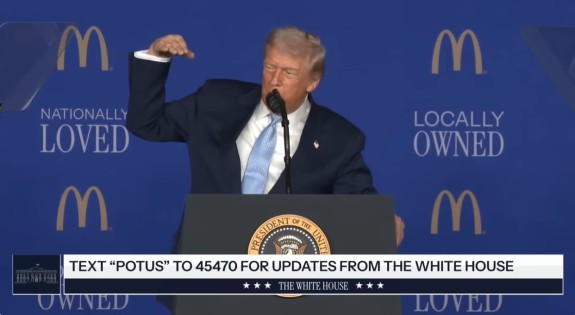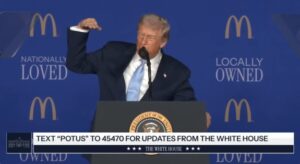By Jeffrey A. Rendall
Affordability is in the eye of the beholder (and voters), a lesson Dems haven’t learned
We’ve heard the term a lot lately, mostly from Democrats or establishment media figures looking to make a point about how “tuned-in” and “in touch” they are about the way things are out there in the hinterlands. “Affordability,” in the political sense, is a nebulous term, not easily defined.
Among the people — you know, in the places in between the coasts where the real living, working and retiring exists — possessing sufficient money to cover the stuff you need and want means a lot. Whether or not one can “afford” an item is an ongoing series of individual calculations and situations and judgment calls.
All politicians make guarantees, and many of the vows aren’t well thought-through. Democrats in particular campaign as though they will deliver a standard of living to everyone. This includes housing, transportation, “justice” (but for what?), a good job that pays for everything you crave and the promise of the American Dream.
Socialism sounds great in theory. The allure of economic equality is strong among people who don’t have much. But with Democrats making promise after promise, they’ve created expectations they can’t fulfill. Sooner or later, their use of “affordability” as the rationale for electing them to office will catch up to them.
They’ll run out of other people’s money to redistribute. This is a certainty. Democrats never learn. In an opinion column titled, “Why Democrats are owning the affordability argument”, the always insightful Joe Concha wrote at the Washington Examiner last week:
“… Democrats, amazingly, somehow own [the affordability] issue if last week’s elections are any indication. Mayor-elect Zohran Mamdani won comfortably in New York despite being a pro-Jihadi antisemite with almost no real work experience while embracing socialism in the financial capital of the world. His message of affordability, slickly produced on social media with a smiling Mamdani promising lots of free stuff like the next coming of Oprah Winfrey, helped him win an election despite having little name recognition until just a few months ago.
“Mikie Sherrill in New Jersey and Abigail Spanberger in Virginia both won their gubernatorial races by focusing on lowering housing and energy costs. Exit polls, as a result, showed all three candidates trouncing their opponents on the affordability issue.
“’It’s the wealthiest city in the wealthiest country in the history of the world, and yet, 1 in 4 New Yorkers are living in poverty, and the rest are seemingly trapped in a state of anxiety,’ Mamdani told Meet the Press last month. ‘We’ve seen that this is a city that needs to be affordable for the people who build it every day. Our focus was on exactly that, and by keeping that focus on an economic agenda, we showed New Yorkers that this could be more than just a museum of what [it] once was.’”
Voters who fell for such stylized pitches deserve what they get. It’s one way I rationalize losing political races whenever something unthinkable happens at the ballot box. And the recent Democrat victories absolutely qualify for inclusion in the “unthinkable” category.
As I’ve written a lot about lately, voters in the aforementioned jurisdictions were suckers for the Democrat message, which largely consisted of, “Donald Trump is terrible and we oppose him”, along with, “Republicans caused the government shutdown and they’re to blame,” and finally, “we’ll (Democrats) make life more ‘affordable’ for those who are struggling.”
The word “affordability” serves as the sugar and cream for every liberal schlep’s bitter coffee. It takes the edge off the straight costs and makes something palatable that might otherwise be beyond reach.
Like everything else Democrats pledge, it’s a ruse. When Democrats suggest they’ll make common necessities “affordable”, it means they’ll try and achieve lower costs by taxing the “rich” and redistributing their confiscated income to the “poor” (complete with another fat layer of bureaucracy), or they’ll arrange to pay producers of goods and services directly to subsidize and encourage them to slash their retail prices. Or, the Democrats’ preferred method, which is simply to impose price controls, which they appear to believe will magically make something more “affordable” by dictating the maximum an owner or manufacturer can charge for their goods.
Authoritarians love price controls – it makes a complex problem easy – but the limits never work. Markets are the only way the true “cost” of an item can be garnered. That’s basic economics.
But Democrats don’t care about economics, and that’s why their promises to make things “affordable” are worth about as much as the weight of the air and spit used to articulate them. Deep down, Democrats appear to think the government can make stuff “affordable” just by saying so.
How?
For his part, then-candidate Donald Trump certainly issued a heap of assurances last year to work to help people pay for the costs of living. Much of Trump’s MAGA platform centered on bringing energy costs down. Trump understands that energy drives the economy, and when people see lower totals at the gas pump, they’ve achieved a cut in expenditures right there.
Senile Joe Biden and Democrats desired to drive up energy costs to encourage consumers to consider “alternatives” (like wind and solar) that supposedly have real (but invisible) benefits, such as controlling “climate change”. They reason, “People will be willing to pay more when they realize the climate is in ‘crisis’ and drastic measures are mandatory to save the planet.”
Citizens don’t recognize supposed improvements in the ozone layer, but they surely know it when their heating bills skyrocket. It’s common sense, isn’t it? Democrats don’t care, but their proposals sure sound good at election time, don’t they?
President Trump also promised to implement policies that foster economic growth, such as cutting tax rates and oppressive government regulations as well as going after waste, fraud and abuse in programs intended to help people. This was the impetus for creating DOGE (Department of Government Efficiency) which conducted extensive investigations and made recommendations on how to purge excess and have government run more efficiently.
And, as everyone is aware, Trump based his campaign on eradicating the scourge of illegal immigration, a goal that’s all-but been achieved. Illegal aliens have stopped coming. Zero illegal invaders were released into the country last month. Enforcement has been stepped up, causing a huge uproar among leftists. Deportations for criminal aliens have continued without stopping.
Illegal alien competition for jobs and resources will be limited as time goes on. Congress, at some point, will finally be forced to address the entire notion of immigration. Trump was behind all of it.
Meanwhile, President Trump has reimposed tariffs to compel foreign competitors to play fair in trade practices, and also as a means to raise revenue. The establishment media mocks the argument, but these actions are geared towards “affordability” in the abstract. Prices are too high right now, but they will level off and hopefully go lower. Meanwhile, wages will increase.
Lastly, one sign that Trump acknowledges there’s an “affordability” problem is his unofficial proposal to provide “rebate” checks to lower income earners from tariff revenues. Is this an acknowledgement that tariffs have made prices higher in some areas?
History proves that Trump’s policies will work in the macro economy if given time, because the market is in charge, not motivated by government pushing the economic buttons and redistributing income based on a politician’s or bureaucrat’s whims. When government chooses winners and losers, it’s an opened door for corruption. How else did Nancy Pelosi make her millions? (Sounds like Virginia’s Abigail Spanberger did it too.)
So, President Trump isn’t wrong when he says “affordability” has markedly improved in the months since his policies supplanted those of the previous administration. Prices have stabilized and will gradually get better once Trump’s ideas have time to work. Americans will have more income in their pockets from paying less in taxes. Interest rates should come down. Jobs will proliferate because more will be available. Wages will go up. The massive amount of foreign investment Trump helped stir will foster domestic economic growth.
Trump and his team of business leaders know what they’re doing. MAGA’s belief in the abilities and intelligence of the individual can’t lose. But Democrats will still obsess on the “affordability” issue, and voters will fall for the sell-job if Republicans don’t tailor their own messages to address the phenomenon. Stay tuned.
–Trump talked affordability the other night addressing the McDonald’s Impact Summit:
YouTube link: https://www.youtube.com/embed/QPid-oVSSi4?feature=oembed
Jeff Rendall is editor and publisher of GolfintheUSA.com and has written about golf and politics for over a quarter of a century. A non-practicing attorney from California, he moved to the east coast three decades ago to pursue and combine his interests in all things American history and culture. Jeff has worked as an intern on Capitol Hill and in various capacities in grassroots organizing and conservative organizations and publications, including a nearly two-decade stint at ConservativeHQ.com. Column republishing inquiries: Rendall@msn.com .


